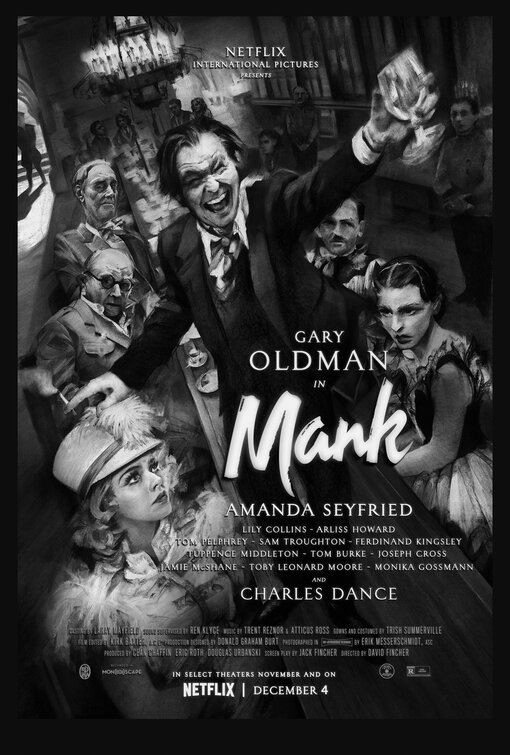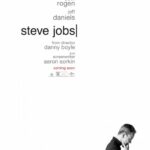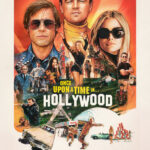Director
David Fincher
Starring
Gary Oldman
Lily Collins
Amanda Seyfried
Charles Dance
In 1940, screenwriter Herman Mankiewicz [Oldman] is contracted to pen a script for Orson Welles (played by Tom Burke) but ends up in a car crash and is forced to take on assistance writing the script; this comes in the form of Rita Alexander [Collins]. Isolated, Mank’s mind wanders and through flashback we learn of his time at MGM and his friendship with Marion Davies [Seyfried] and paper tycoon William Randolph Hearst [Dance] that went on to inspire the story for Citizen Kane.
Other than pieces like Trumbo, Barton Fink and Adaptation, films about screenwriters are few and far between and very rarely flattering. And why would they be? Writers are very under-appreciated in Hollywood yet absolutely integral to its success and when scrutinised by fellow screenwriters, they often fall victim to whatever insecurities the individual holding the pen sees within themselves. With this in mind, it’s worth noting that Mank is very much an accompaniment piece like Ed Wood or Shadow Of The Vampire, that works fantastically on its own but really needs an understanding or appreciation of the movie that inspired its conception; in this case Citizen Kane.
One thing that is absolutely undeniable, even to the laymen, is that this film is marvellously constructed. The script is brimming with incredibly witty, fast paced banter and oozes charm. Curiously enough, there’s a nice parallel between the rhythm of the score and that of the dialogue. Speaking of which, Reznor/Ross’ jazzy transportive score is superb. Musically speaking their talent has been undeniable but few could have predicted the impressive range they have put on display in the last few years alone.
Unsurprisingly for Fincher, this movie is masterfully shot. The cinematography, grading, scene transitions and direction all bear the distinct stylings of Kane. Even the sound design has the echoy resonance to the dialogue from the 40s and that’s before we get to the subtle buried details like cigarette burns prompting reel changes followed by an ever-so-slight shudder implying the projectionist has just fitted the next part of the movie. But for all its focus and attention to minutiae, this obsessive love letter surprisingly does very little to dissect the classic Hollywood machine or bring anything new to the Welles/Kane story.
Anyone who knows the rough history around the writing of one of cinema’s greatest films will know that certain liberties have been taken and aside from the narrative structure there’s not as much about Citizen Kane as one would expect, more the individuals and events that inspired its creation. Most curiously, while Hollywood loves Hollywood, this film truly thrives in the politics it puts on show. Set in the formative late 30s, with war in Europe on the rise, one can hardly avoid politics but it’s more Mankiewicz’s combative personality and lack of filter that really exposes his peers and provides the movie with some of its greatest scenes.
Regrettably, there’s a distance from everything, unlike other biopics, you feel like a passenger as this film careens past, with a cavalcade of drinks, scripts and witty put-downs. The trouble is, you don’t get a chance to really connect with anyone. The Hollywood machine is so vacuous and fake and distant from the real-world struggles that feeling for these individuals is nigh on impossible and even peripheral individuals like Herman’s wife Sara, his housekeeper Frieda or typist Rita never get fully explored, despite bluntly revealing fascinating developments that could bring the audience closer, save a few throwaway lines.
It’s also notable that this film has been created for a specific and intended audience, making little consolation for the casual viewer. This is in no way a slight – it’s good to create something with integrity, regardless of any supposed audience – and the film seems to actively challenge that concept when Mank is instructed to “write hard, aim low.” But while I was watching the film, I couldn’t help but question why Fincher chose to make this film. I feel this becomes a little clearer when it closes with a heavy emphasis on Mank dying at 55 years old and the credits reveal the screenplay was written by Fincher’s own late father – who died some seventeen years ago. Suddenly this shifts from a simple passion project biopic to an extraordinarily personal production. But regardless of intentions or technical prowess, Mank’s ultimate flaw is that it exists in Kane’s shadow and will never escape it; more than that, in spite of the love and care that has been injected into every single frame, it is forgettable.
Release Date:
04 December 2020
The Scene To Look Out For:
During one of Hearst’s many parties, conversation turns from industry gossip to politics, the rise of the right and the differences between socialism and communism. Despite a fairly simple setup wherein characters are almost entirely stationary, it’s magnificently framed, constructed and acted. If there was going to be a single scene released to highlight what this film sets out to achieve, it’d be this one.
Notable Characters:
Amanda Seyfried is magnificent in a cast of deeply magnificent actors but in truth, Oldman’s permanently inebriated Mankiewicz delivers perfectly crafted barbs and dissections in almost Shakespearean monologues and does it with effervescent dexterity. Frankly, he carries the film effortlessly and serves as another example of why he’s one of the best.
Highlighted Quote:
“The narrative is one big circle like a cinnamon roll, not a straight line pointing to the nearest exit. You cannot capture a man’s entire life in two hours, all you can hope is to leave the impression of one”
In A Few Words:
“A beautiful celebration of talent and eccentricity but one that falls just short of excellence”
Total Score: 4/5
![The Red Right Hand Movie Reviews [Matthew Stogdon]](https://reviews.theredrighthand.co.uk/wp-content/uploads/2021/12/cropped-header1.png)




